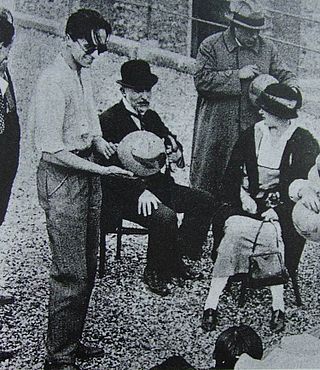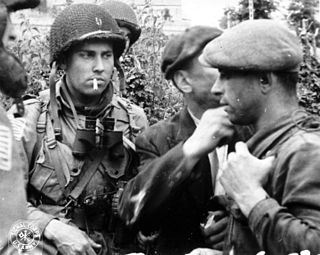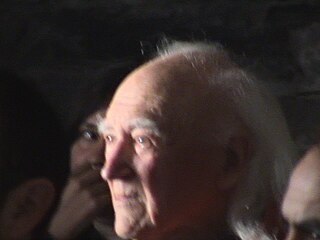External links
Films directed by Alexander Esway | |
|---|---|
|
| Sky Battalion | |
|---|---|
| Directed by | Alexander Esway |
| Written by | Joseph Kessel |
| Produced by | Wilfrid Baumgartner Raymond Borderie Adrien Remaugé |
| Starring | Raymond Bussières Howard Vernon Pierre Blanchar |
| Cinematography | Nicolas Hayer |
| Edited by | Léonide Azar |
| Music by | Manuel Rosenthal Maurice Thiriet |
| Distributed by | Pathé |
Release dates |
|
Running time | 130 minutes |
| Country | France |
| Language | French |
Le Bataillon du ciel (Sky Battalion) is a 1947 French film in two parts by Alexander Esway about the Second World War. The film, written by Joseph Kessel, became the biggest box office success in France that year with more than 8 million tickets sold. [1]
The first part, Ce ne sont pas des anges (They are no Angels) was released on 8 March 1947, the second part Terre de France (The land of France) one month later. The total length is 3 hours and 20 minutes. It tells the story of French parachute troops who train in Free France and then land in Brittany the day before the Normandy landings to fight against the Germans. [2] [3]
Despite being one of the few films to deal with the resistance against the German occupation from within Free France (the most important other one being Taxi for Tobruk ), it was cited a lot less in studies of French films dealing with the Second World War than films about either the resistance within occupied France, or the efforts by the Allies. [4]

French cinema consists of the film industry and its film productions, whether made within the nation of France or by French film production companies abroad. It is the oldest and largest precursor of national cinemas in Europe; with primary influence also on the creation of national cinemas in Asia.

Jean Moulin was a French civil servant and resistant who succeeded in unifying the main networks of the French Resistance, a unique act in Europe. He served as the first President of the National Council of the Resistance during World War II from 27 May 1943 until his death less than two months later.

Free France was a political entity claiming to be the legitimate government of France following the dissolution of the Third Republic during World War II. Led by General Charles de Gaulle, Free France was established as a government-in-exile in London in June 1940 after the Fall of France to Nazi Germany. It joined the Allied nations in fighting Axis forces with the Free French Forces, supported the resistance in Nazi-occupied France, known as the French Forces of the Interior, and gained strategic footholds in several French colonies in Africa.

Joseph Kessel, also known as "Jef", was a French journalist and novelist. He was a member of the Académie française and Grand Officer of the Legion of Honour.

René Clair, born René-Lucien Chomette, was a French filmmaker and writer. He first established his reputation in the 1920s as a director of silent films in which comedy was often mingled with fantasy. He went on to make some of the most innovative early sound films in France, before going abroad to work in the UK and USA for more than a decade. Returning to France after World War II, he continued to make films that were characterised by their elegance and wit, often presenting a nostalgic view of French life in earlier years. He was elected to the Académie Française in 1960. Clair's best known films include Un chapeau de paille d'Italie, Sous les toits de Paris, Le Million (1931), À nous la liberté (1931), I Married a Witch (1942), and And Then There Were None (1945).

The Francs-tireurs et partisans français (FTPF), or commonly the Francs-tireurs et partisans (FTP), was an armed resistance organization created by leaders of the French Communist Party during World War II (1939–45). The communist party was neutral at first, following the Soviet Union's official view that the war was a struggle between imperialists, but changed to a policy of armed resistance against the German occupation of France after Germany invaded the Soviet Union in June 1941. Three groups were formed, consisting of party members, young communists and foreign workers. Early in 1942 they were merged to form the FTP, which undertook sabotage and assassinations of the occupation. The FTP became the best organized and most effective of the French Resistance groups. In March 1944, before the Allied forces returned to Normandy, the FTP was theoretically merged with the other Resistance groups. In practice, it retained its independence until the end of the war.
Jacques Becker was a French film director and screenwriter. His films, made during the 1940s and 1950s, encompassed a wide variety of genres, and they were admired by some of the filmmakers who led the French New Wave movement.

Maurice Bardèche was a French art critic and journalist, better known as one of the leading exponents of neo-fascism in post–World War II Europe.

The Vel' d'Hiv' Roundup was a mass arrest of Jewish families by French police and gendarmes at the behest of the German authorities, that took place in Paris on 16–17 July 1942. The roundup was one of several aimed at eradicating the Jewish population in France, both in the occupied zone and in the free zone that took place in 1942, as part of Opération Vent printanier. Planned by René Bousquet, Louis Darquier de Pellepoix, Theodor Dannecker and Helmut Knochen; It was the largest French deportation of Jews during the Holocaust.

The French Expeditionary Corps, also known as the French Expeditionary Corps in Italy, was an expeditionary force of the French Liberation Army. Created in 1943, the corps fought in the Italian Campaign of World War II, under the command of General Alphonse Juin. Consisting of 112,000 men divided into four divisions, all but one of the divisions were colonial units, mostly Moroccans and Algerians drawn from the Army of Africa and led by French officers. Overall the Expeditionary Corps was composed of approximately 60 % of colonial troops.
Henri Jules Louis Jeanson was a French writer and journalist. He was a "satrap" in the "College of 'Pataphysics".

Vichy France, officially the French State, was the French rump state headed by Marshal Philippe Pétain during World War II. It was named after its seat of government, the city of Vichy. Officially independent, but with half of its territory occupied under the harsh terms of the 1940 armistice with Nazi Germany, it adopted a policy of collaboration. Though Paris was nominally its capital, the government established itself in the resort town of Vichy in the unoccupied "free zone", where it remained responsible for the civil administration of France as well as its colonies. The occupation of France by Nazi Germany at first affected only the northern and western portions of the country, but in November 1942 the Germans and Italians occupied the remainder of Metropolitan France, ending any pretence of independence by the Vichy government.

Pierre Blanchar was a French actor. He appeared in more than 50 films between 1922 and 1961. Blanchar was married to actress Marthe Vinot, with whom he had a daughter, actress Dominique Blanchar. He played Napoleon in the 1938 British film A Royal Divorce alongside Ruth Chatterton as Josephine. He later appeared alongside Michèle Morgan in the 1946 film Pastoral Symphony.
Résistance-Fer was a French Resistance group against the German occupation of France during the Second World War.

René Vautier was a French film director. His films, which were often controversial with French authorities, addressed many issues, such as the Algerian War, French colonialism in Africa, pollution, racism, women's rights, and apartheid in South Africa. Many were banned or condemned, and one caused him to go to prison for a year.
"Résistancialisme" is a neologism coined by historian Henry Rousso to describe exaggerated historical memory of the French Resistance during World War II. In particular, résistancialisme refers to exaggerated beliefs about the size and importance of the resistance and anti-German sentiment in German-occupied France in post-war French thinking.

Albert Ouzoulias was a French politician and a Communist leader of the French Resistance during World War II (1939–45) using the name of "Colonel André". He played a major role in the 1944 liberation of Paris.

The clandestine press of the French Resistance was collectively responsible for printing flyers, broadsheets, newspapers, and even books in secret in France during the German occupation of France in the Second World War. The secret press was used to disseminate the ideas of the French Resistance in cooperation with the Free French, and played an important role in the liberation of France and in the history of French journalism, particularly during the 1944 Freedom of the Press Ordinances.

Yvon Morandat [aliases "Léo", "Mareuil" and "Arnolphe"] was a trade union leader, a member of the French Resistance as an SOE RF Section/Bureau central de renseignements et d'action operative and a French politician.